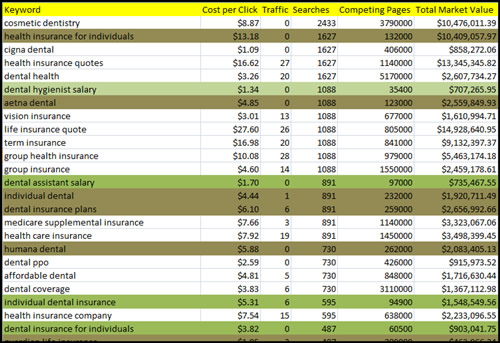It seems that everyone talks about SEO, but the conversation is typically waist deep. The reason why is, if they spilled their most cherished testing methodologies, two things would happen (1) your competition would use them against you and (2) search engine engineer’s would use that information to nullify results through adapting filters to offset the effectiveness of such “newly discovered” techniques.

Keyword Research, SEO and Missed Opportunity
Looking at this from the perspective of SEO serving a means to an end to facilitate a goal, that goal is to deliver the most relevant and targeted traffic possible to specific landing pages within your website.
Search tactics may sound simple enough, but breaking them down to the main ingredients, what matters is which keywords you use to target users and what percentage of market share they represent.
Obviously, the more competitive or lucrative the keyword, the stronger on page and off page considerations need to occur in order to offset the magnitude of the volume, density or authority of content from the other websites targeting this traffic / keywords and key phrases, for the very same reason you are.
The fact that conversion is the spine of what type of economic endeavor you can execute based on the return on investment you will need to continually push the envelope of relevance, content, link acquisition and ongoing maintenance or revisions to the site itself, budget is a definitive factor which correlates to just how hard your push for the more competitive keywords can be.
That is why this alternative tactic is equally as appealing as targeting the most competitive or lucrative key phrases, it suggests you broaden your scope to embrace something more dynamic and practical (targeting semantic keyword clusters) instead of stand-alone rankings.
My friend Russell Wright from themezoom.com has defined this principle eloquently and knows more about SEO than 99% of the so called search engine optimization community. This one principle known as the “qualified less imperfect” (QLI) score. Russell summarizes how potential search engine algorithms sculpt relevance score and position and how you can use simple search operators to test the competitiveness of keywords; but more importantly how those keywords fit into a larger schema is what matters. He discusses this principle in detail in the basement silo lectures (link below).
I am not going to get into what they are all about (as it is only one of hundreds of SEO principles), as this is not an affiliate speal, it’s just an acknowledgment to someone who really knows their stuff and in my honest opinion is one of the foremost keyword experts out there who we have the opportunity to glean tactics from which when applied distinguish the amateurs from the pros.
There will be related links at the end of this post which you can feel free to explore, and I would highly suggest you do if you are looking for truly revolutionary and actionable intelligence that you can apply and put to work on your behalf.
These guys eat search engine algorithms for breakfast and spit out a private arsenal of SEO tools that most people would merely drool over. The ultimate objective and prime motivating factor…SERP (search engine result page) domination through using the semantic connectivity of the web, site architecture, value proposition, conversion funnels, call to action and affiliate enterprise that makes the whole client based SEO model virtually obsolete.
All of this starts and ends with one simple facet – “keywords”… If you fail to understand the depth or breadth of your market, you will only scratch the surface and target the same old generic keywords that millions are competing for.
Without giving away the farm on this one, the main distinguishing factor between high-level advanced SEO and run of the mill “generic” SEO implementation is the ability to (a) grasp your market’s scope (b) identify trends, seasonal patterns and search behaviors and (c) actually build this into a system whereby it can be replicated regardless of industry, market or niche.
In the past we discussed how to identify your competitor’s keywords, how to find keywords using a low-tech related search and wonder wheel method, how to use keyword modifiers to expand semantic keyword traction and which keywords are most profitable…But what about the missed keyword opportunities that exist do to relying on a narrow base of keywords or phrases to drive the lion’s share of traffic.
Keywords translate to dollars and sense, the more relevant they are to your business offering, the more diverse they are based on the mind-set of the person searching, and the delivery of relevant, persuasive actionable choices the visitor is presented with all determine the extent of conversions your website experiences from the aggregate overlapping variables.
You also have to consider the barrier to entry, the virtual SEO tipping point (where on page and off page SEO meet relevance, domain and page authority) to create a dominant SERP position, and just how much it is going to cost and how much time it is going to take to bag a competitive keyword or keyword cluster.
If you want to see fantastic returns on SEO, then you have to excel where others merely get by. This is in how deep you dig to find profitable keywords (meaning high traffic yield and low competition), how you employ your content development strategy and what types of CMS (content management system) you have in place and whether or not it is SEO friendly or pliable enough to change overlapping components which could create duplicate content and create null sets in your data which push you further away from the top results for any given keyword.
We have written a few pieces on SEO for Large Websites, considerations for sitewide server side includes, how to wire an ideal SEO friendly Template and even created free SEO Plugins that rival the most popular and widely used plugin ever devised for WordPress.
Why, because that is our way of saying thanks for being a part of this burgeoning new industry. Nothing stays the same for long in the SEO community, it is truly a continual work in progress. My only suggestion to those searching for more information, data, knowledge, strategies, SEO tactics or techniques is to (1) keep an open mind and (2) don’t be afraid to try things for yourself and (3) don’t think you know it all, because you don’t.
SEO involves testing hundreds of recipes to find the one that works, and just because it works now, there is no guarantee it will work later. So, the takeaway here is, it’s all about your toolbox and focusing on primary metrics that add value beyond the scope of the purpose of SEO.
That means engaging link-worthy content, value for your community all served up through an SEO friendly platform based on solid market intelligence, competitive analysis and superior conversion optimization.
There is no substitute for impeccable keyword research, why settle for a few keywords, when with the same effort you could have dozens, hundreds or thousands of multiple keywords all working for you based on solid search engine information retrieval protocols.
We have only scratched the surface of this conversation in context to what elements you can take away from the undertones. What happens next is up to your own willingness to learn, apply and push the envelope of relevance and conversion.
As promised, here are the related posts and references for your perusal:
- http://www.themezoom.com/tz_members/LSI_CRUSHING_SEO/Content-LSI.pdf (44 page e-book from 06, where most SEO’s are still stuck).
- http://www.youtube.com/watch?v=KMS7gFsc5Gk
- http://www.youtube.com/watch?v=9Sw4_AlxM3Q (the basement silo lectures) a must watch for context.









Great post!
I’ll be back tonight to follow those links. ;)
Thanks,
Slim Jim:
Thanks, they are worth their weight in Gold…
Russell Wright and Sue Bell are the real deal when it comes to heavy hitting SEO and beyond.
Hi very interesting post on keyword research. Keyword research is the initial point of internet marketing. My recommendation is that first take low competition keywords and after get rank on those keywords then try to take high competitive keywords.
Chandan:
We have an inside joke, Target the low hanging fruit to acquire the root. Indeed a good starting point for a site wet behind the ears.
More importantly, for seasoned sites, they need to expand laterally to embrace more related keywords that are just as lucrative to yield tangential traffic to their sites as well.
For example, someone looking for “vacation packages” would also be interested in “local tours of (location)” or “rental cars” in the region as well.
So, if a website selling one or the other wanted to appeal to those types of visitors organically, they need to first start with the bridge (semantics and keyword research) to identify relevant offerings to cross-promote.
Great post Jeffrey. I haven’t read the themezoom stuff for a while, since charles heflin directed me there about a year or two ago. I’ll definitely check those links out this afternoon.
When you say to target keyword clusters, does it often pay off to target as many modifiers, related keywords and long tail keywords as possible in one article? For example, I was reading a post from the Wordtracker academy that talked about how one page received traffic from over 10,000 different search terms and they suggested that articles over 1000 words were ideal. I used to write articles (or have them written) of about 400 words, but just yesterday rewrote a 400 word article into a 3000+ word article to see whether there’s a noticeable difference in long tail traffic.
Is it better to write a group of articles for the benefit of internal linking and more pages, or write longer articles to target as many keywords and longtails as possible?
I’m guessing you might say that both is the answer, but I’d enjoy your opinions.
Thanks again Jeffrey.
Justin
Keyword clusters implies that you observe the connectivity between the keywords and modifiers and write content for each node.
Then, you can contextually link those nodes / pages or posts to rank for everything under the umbrella for all the keywords belonging to that cluster using specific landing / destination pages for each.
I prefer to write longer posts and based on our testing as well, the longer the post, the more weight it can carry. I would say 500-750 words min. is a good traction point.
It takes a certain degree of content to “break away from the code in the template” depending on how heavy it is, so, the more context you can provide (with addition text), the better.
On your first point about targeting mid-tail and long tail traffic, you don’t have to worry so much about that, the more authority a site gains, the more mid tail and long tail traffic it gets.
From a really strong site, just a mention of a word one time in correlation to another keyword is more than enough to push a keyword into the top 10.
Hence, the more your use the related keyword cluster, the more your site will be viewed “as a vector” like one large document when spiders parse it, then the page with the highest co-occurrence, internal links, inbound links from other sites, relevant title and / or meta data which matched the query will be returned.
But, you still have to do the work and build relevance, which is why building a broader net with clusters is never a bad idea.
I see. Thank you Jeffrey. That’s got me a lot to work on! Kind of addictive this SEO stuff!
Justin
Really, I liked this article, recognize our own keywords and find a gap for the keywords that we will enter.
Some great information to be absorbed in this post. This post is well written thanks for the post!